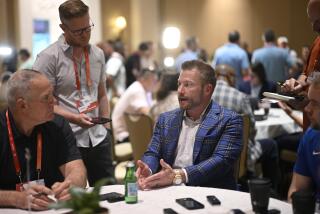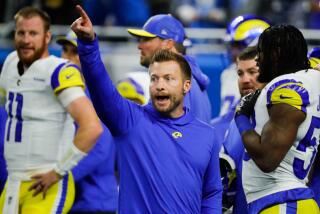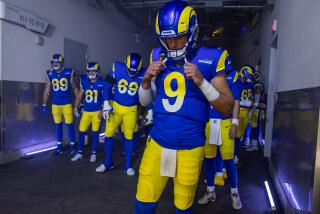There Are Weaknesses at Top, Too
- Share via
Until last week, the Jacksonville Jaguars and St. Louis Rams seemed to be hurtling toward the Super Bowl.
It’s clear now, though, that St. Louis really needs more defense and Jacksonville more offense.
So NFL people will watch today’s games more closely than usual, even though the Rams and Jaguars are playing soft touches.
The Rams are at San Francisco, whose record-setting 18-year domination of pro football since 1980 is now only a memory.
The Jaguars are at home tonight to New Orleans, which has seemed out of its depth against every opponent since opening day except the 49ers.
St. Louis and Jacksonville have shown a lot of promise but neither is a complete team yet, and last Sunday’s games proved that.
Jacksonville, 8-1, the league’s only once-beaten team, played not to lose to 3-6 Baltimore, and made good, sort of, 6-3. Once more, in his understanding of what it takes to win pro football championships, Jaguar Coach Tom Coughlin appeared to have a solid grasp of everything but the one thing that might beat him in a Ram game: pass offense.
Meanwhile, the Rams, 7-2, were rolling up the score last week, 35-10, but the team they beat, the Carolina Panthers, controlled the ball for up to eight minutes at a time and kept the Ram air force off the field for much of the second half.
With more scoring punch, the 3-6 Panthers could have overcome their two game-turning mistakes, which gave the Rams two cheap touchdowns on an interception return and fumble return.
You expect more of the NFC’s best team.
*
Rams right sort: The Rams have the kind of team that might trouble the Jaguars on Super Bowl day if both clubs get there.
In particular, the St. Louis players match up smartly against Jacksonville’s.
The Rams’ strength is their offense, which, with quarterback Kurt Warner throwing to the NFL’s most helpful five-receiver group, figures to score against even a great defense like Jacksonville’s.
The Rams’ weakness, their defense, won’t bother them so much if it’s the Jaguars on the other side.
The Jaguars have the passer, Mark Brunell, but still lack the offensive know-how.
Their strength is that for years, Coughlin has been cleverly putting the Jaguar team together.
The Rams, by contrast, came up overnight from nothingness.
*
Warner learning: Fans watching Warner throw touchdown passes for St. Louis again last week--two of them--have trouble believing that he’s a virtual NFL rookie.
All that stands between him and an official designation as rookie of the year is the time he spent on the Ram bench last season.
Still, he has a few things to learn.
For example, Warner is not at his best when a play breaks down--when his problem is rooted in the kind of offense the Rams have.
The Rams win by getting their receivers out fast and getting the ball to them fast.
But when the receivers aren’t instantly open, Warner, standing around in the pocket, seems lost, often taking a blind-side sack.
Great passers haven’t been bothered that way.
Joe Montana used to do two other things: move and look.
And for Montana, more often than not, there was a payoff.
The films that might help Warner the most show Montana or Steve Young extemporizing on broken plays.
For both 49er quarterbacks, that was very often the difference.
*
Czar Holmgren: In Seattle, the Seahawks’ new coach, Mike Holmgren, is bidding to become the league’s most powerful person since Vince Lombardi.
Having been assigned total control of the franchise by the club’s new owners, Holmgren obviously decided, in his first move as CEO, to make an example of Joey Galloway, the wide receiver who wanted more money than Holmgren would pay and held out until last week in an unsuccessful effort to get it.
Holmgren saw the holdout as an opportunity to teach other Seahawks a useful lesson.
Galloway, whose catches beat Denver last Sunday night in his first game back, 20-17, is the club’s best player, and if Holmgren raise his best player’s salary, what hope does any other Seahawk have in a salary argument?
The money saved will help the Seahawks pay Holmgren his $4 million a year.
*
One-way contracts: Does a player under contract have a moral obligation to keep playing, or is he justified in holding out for more money?
Absolutely, he has that moral obligation, in the opinion of the many. A player’s signature is his bond, the fans and many media spokesmen say.
But it isn’t quite that simple.
Until a player is eligible for free agency, he is on a one-way street in the NFL with any team that signs him to a contract.
The player is bound by that contract, but not the team, which can fire him any time.
Although most NBA contracts are guaranteed, almost no NFL contracts are.
The thing to remember about NFL economics is that the money is there.
Someone is going to get it.
In Galloway’s case, for instance, if it doesn’t go to Galloway, it goes to Paul Allen, the billionaire who owns most of the team.
Or to Holmgren.
*
Remember Levens: It might be worth recalling that Holmgren’s economic policies--which save the company money on the backs of its best players--don’t always succeed.
Several years ago, after Green Bay, then coached by Holmgren, had won the Super Bowl, Packer all-pro running back Dorsey Levens began a long holdout in search of a raise.
With Holmgren’s blessing, management said no.
When Levens, like Galloway, eventually came back, Holmgren called his number repeatedly in that first game.
Most NFL teams, as a rule, never ask their backs to do that. Good running backs seldom carry more than three or four times in their first appearances of the year.
Not surprisingly, Levens was shortly injured, and, lacking a sufficient running game, Holmgren that time lost the Super Bowl.
*
Can Defense Win? Miami Coach Jimmy Johnson’s campaign to win the Super Bowl with a fast, tough defensive team--and not much more--ran into trouble last Sunday in Buffalo, where the losing Dolphins gained only 60 yards running and 41 passing.
Two other longtime defensive powers, Kansas City and Pittsburgh, also lost that day.
If the question is whether big games can be won these days on defense, one answer is that it’s impossible to come up with a winning 11-man defense on every play.
On any NFL afternoon, you aren’t going to play perfect defensive football more than 80% of the time, and even if you do, you can still get blown out on the other 20% of the plays.
By contrast, if a good offensive team plays perfect football 80% of the time, it wins going away.
*
Selected Short Subjects:
* In this trying Denver Bronco season, Terrell Davis’ replacement, rookie running back, Orlandis Gary, continues to hold up his end. In his first six games as the starter, Gary has out-gained Davis in Terrell’s first six Denver starts in 1995.
* Turnovers-are-overrated department: The 5-4 Tampa Bay Buccaneers, who may yet win the NFC Central title, lost five fumbles and an interception Sunday and still won the game, overpowering an AFC defensive power, Kansas City, 17-10.
* It’s hard to understand what’s happened to young Adrian Murrell at Arizona, where in other times he ranked with the NFL’s elite running backs. It also surprised some people when Murrell’s hand-picked replacement, Michael Pittman, a second-year pro from Fresno State, was instrumental in running down Detroit’s proud defensive team last Sunday. On pass plays, Pittman produced 44 yards against the Lions, and on running plays he added 133 in 23 carries. Belatedly but firmly, the Cardinals now say he’s that good.


